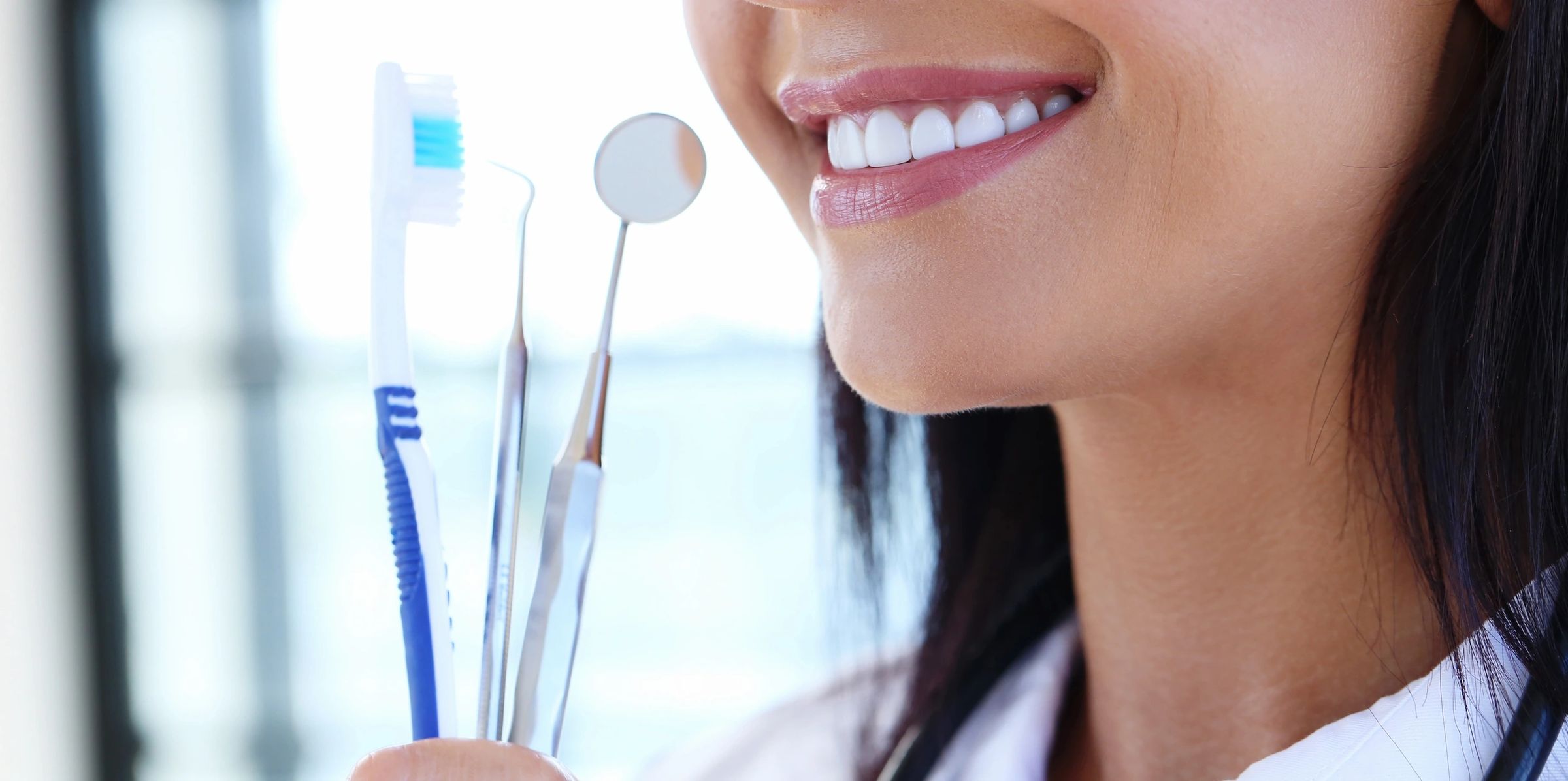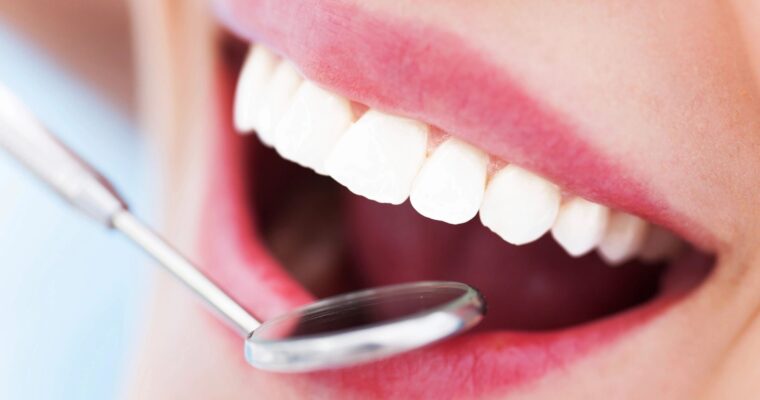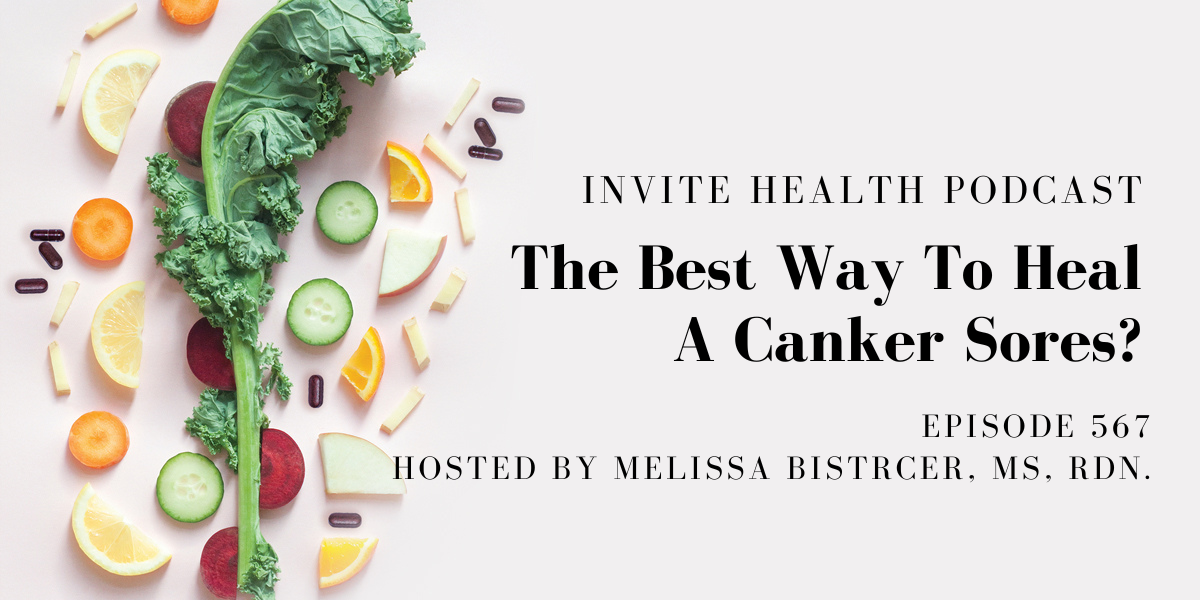Canker Sores
Subscribe Today!
Please see below for a complete transcript of this episode.
The Best Way To Heal A Canker Sores? – InVite Health Podcast, Episode 567
Hosted by Melissa Bistricer, MS, RDN
*Intro music*
InViteⓇ Health Podcast Intro: Welcome to the InViteⓇ Health Podcast, where our degreed healthcare professionals are excited to offer you the most important health and wellness information you need to make informed choices about your health. You can learn more about the products discussed in each of these episodes and all that InViteⓇ Health has to offer at www.invitehealth.com/podcast. First time customers can use promo code PODCAST at checkout for an additional 15% off your first purchase. Let’s get started!†
*Intro music*
Melissa Bistricer, MS, RDN : [00:00:40] Welcome back to another podcast here at InViteⓇ Health. Some people seem to have wanted to know about oral health and how canker sores occur and if there’s anything they can do for them. A canker sore can happen for multiple different reasons. Let me tell you about why they can happen and then supplements that may be able to help with oral hygiene and canker sores.† [00:01:00]
[00:01:00] My name is Melissa Bistricer and I’m a registered dietitian. I am so excited to bring to you the nutritional aspect of nutrients here at InViteⓇ Health. Nutrition, food for thought: to eat is a necessity, but to eat intelligently is an art. InViteⓇ Health promotes an intuitive approach in providing vitamins into your daily life to increase your quality of life. In conjunction with nutrients it is also important to learn and include other lifestyle modifications like nutrition, exercise, and sleep. These practices with the use of vitamins will promote optimal benefits in your daily life.† [00:01:37]
[00:01:37] Canker sores, canker sores are a type of mouth sores, sometimes called ulcers. They are a small, shallow lesion that are developed on soft tissue of the mouth based on the gums. They are not contagious and are generally irritating and very painful. Canker sores can be caused by stress, acidic foods and minor injuries to the inside of the mouth. Most canker sores are round or oval with white or yellow in the center and a red rim around that. It is the inside of the mouth that is generally under the tongue, inside the cheek or lips at the base of the gums. There are actually several types of canker sores, such as a minor, major and herpetiform canker sores. The cause of a canker sore is unknown and unclear. Some research has suggested that triggers for canker sores can be minor injuries like dental work, sports mishaps or accidental cheek biting. It can also be caused by toothpaste and mouthwash containing sodium sulfate, food sensitivities and a diet lacking in vitamin B12, zinc, folate and iron. There are also triggers such as allergic responses to certain bacteria in the mouth, H. Pylori and emotional stress. There can also be cases where canker sores are more common to occur specifically in disease conditions. These disease conditions can be celiac disease, inflammatory bowel disease, or an immune system attached to the cells, and lastly, HIV and AIDS. † [00:03:07]
WHITE TEA FOR YOUR ORAL HEALTH – INVITE HEALTH PODCAST, EPISODE 363 >> Listen now!
[00:03:09] Risk factors can be for periodontal diseases such as smoking, older age, especially over the age of 65 and female gender. So how can we limit and get rid of canker sores? The first way that I would recommend is, that I’ve seen really work is to get rid of the canker sores quickly is using salt water or baking soda in lukewarm water, just swish that in your mouth and spit it out the water. Do that every night till you start to see the canker sore going away and you’re starting to feel better. Prevention is a very big component. You want to try to limit the occurrence by watching what you eat. Trying to avoid foods that may irritate the mouth like nuts, chips, pretzels, spicy foods, or acidic foods. You want to focus on eating healthy foods to prevent the deficiencies. You want to try and eat as much fruits, vegetables and whole grains in your diet. We should also try to practice good oral hygiene. This means brushing our teeth after meals and flossing once a day. To keep the mouth clean of foods that might trigger the sore. We need to also reduce stress. Canker sores are related to stress, so learning how to reduce stress by using techniques like meditation or a natural supplement like L-Theanine or 5-HTP.† [00:04:22]

[00:04:24] Diet and lifestyle are two things to take into consideration to limit and reduce canker sores on a regular basis, it is best to consume a diet lower in sugar, processed starches and soda. You want to increase your vegetables, fruit and whole grain intake, and especially calcium from dairy products to lower the risk of periodontal disease. A probiotic supplement or probiotic foods may help your gums and prevent bleeding. Specifically, acidophilus, which does not only have to be in a supplement pill form, it actually is naturally found in yogurt. The connection to a probiotic and the canker sore is to help stimulate the immune system to help the sore heal. CoQ10 has also been studied in a randomized controlled trial for patients with periodontal disease that underwent a root canaling. And they seem to have a significant reduction in gum inflammation while taking CoQ10 than the placebo group. Fish oil has also been seen to help periodontal disease, to help lower inflammation from omega three fatty acids. The fish oil has been also associated with heart health, type two diabetes, and autoimmune disease. Lycopene has also been clinically trailed to help with periodontal issues as well. The individual who took lycopene orally has been has seen a more, has seen a better effect than those in the placebo group. Lysine has been shown to help shorten the duration of a canker sore. † [00:05:53]
[00:05:54] Lysine is an amino acid, you can get it as a supplement form. Lysine considerably shortens the duration of the canker sore if you feel a canker sore coming on within the one week period, start taking a thousand milligrams of lysine every single day and you will definitely see the benefits of reducing the duration of the canker sore. So, what vitamins are lacking if you get a canker sore? In recent studies, it has been shown that canker sores have been caused by triggers or a lack of vitamins or nutrients that can be from folic acid, zinc, or iron. Deficiencies of calcium were also noted. However, calcium deficiency wasn’t clearly linked to aggravate the situation. Healthy eating again can certainly aid in the fight against canker sores. † [00:06:42]
SKIN AND ORAL CARE TIPS WHILE WEARING A MASK – INVITE HEALTH PODCAST, EPISODE 179 >> Read Now!
[00:06:43] So, getting exposure can definitely look like this. To help reduce the painful canker sores in your mouth. You want to try and avoid foods with acid or anything that is spicy to not irritate the sore further. You want to use salt water baking soda with lukewarm water for about a week to help shrink the canker sore. You want to practice good oral hygiene with brushing your teeth and flossing one time a day. You want to consume a lot of fruits and vegetables and whole grains to eliminate the sugary foods in your diet, such as soda and processed foods. You want to make sure you’re hitting the categories of fruits, vegetables and whole grains to prevent any deficiencies from folate, zinc, iron, and B12. Which may have caused the canker sore to come.† [00:07:27]
[00:07:28] In terms of supplements, you can use lysine to prevent and help heal the canker sore. There may be some benefits in taking a comprehensive multivitamin to eliminate the chance of deficiencies. As well as that may be impacting on your oral health. You can also try and take probiotics or eat probiotic food. So you can check out our lysine and multivitamins that are sold at invitehealth.com. Check it out and if you have any further questions, you can always chat with me as a nutritionist or any of our health care providers to assist you at invitehealth.com or email me at mbistricer@invitehealth.com. I am Melissa Bistricer, RDN, ready to share the knowledge to help you modify your lifestyle to live a happier, more successful life. I am looking forward to continuing to provide you with educational podcasts and blog posts. I want to thank you so much for tuning in to the InViteⓇ Health Podcast. Remember, you can find all of our episodes for free wherever you listen to podcasts or by visiting invitehealth.com/podcast. Again nutrition food for thought: To eat is a necessity, but to eat intelligently is an art. Have a great day and tune in for the next podcast coming your way soon. † [00:07:28]
*Exit Music*











